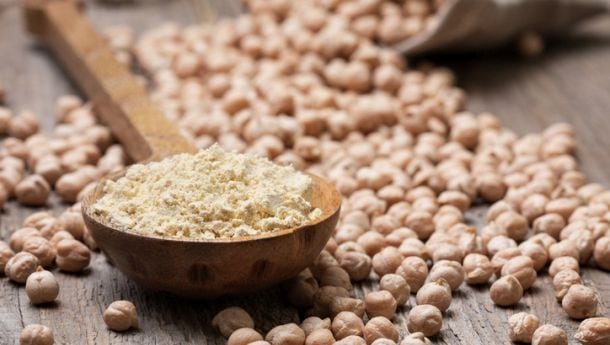While chickpea protein is not yet produced on a commercial scale by any of the major players in plant proteins, there is growing interest in its potential to create better-tasting meat and dairy alternatives as foodtech firms such as Nutriati and Israel-based InnovoPro (which recently attracted investment from Ingredion) develop technology to extract highly functional chickpea ingredients.
New chickpea varieties with 75% more protein, meanwhile, could catapult the nitrogen-fixing legume from a niche to a mainstream player in the plant protein arena, according to San Francisco-based startup NuCicer, which is also developing varieties with specific functional attributes tailored for food applications.
Foaming, mouthfeel, and viscosity
Nutriati – which launched chickpea ingredients onto the market in 2018 and produces them via co-manufacturers (which which Tate & Lyle will continue to work) - has developed a patented process yielding highly functional pulse proteins and flours with potential to unlock new opportunities in plant-based meat, dairy, gluten-free bakery and snacks.
While its Artesa chickpea protein is not a complete protein like soy, egg, or casein, it is a high quality concentrated protein source with a digestibility score of 93% and a PDCAAS of 0.82 – at the top end of the scale for plant-proteins.
The protein - which is white, odorless, and neutral-tasting with a hint of nutty sweetness – has no beany taste, which makes it attractive for manufacturers of products such as plant-based beverages and ice cream, according to co-founder and CTO Michael Spinelli, a food R&D veteran who rose up the ranks at Ben & Jerry’s and chickpea-fueled brand Sabra, and co-founded Nutriati in late 2013.
“When you look at foaming, mouthfeel, and viscosity, we can offer functionality that you don’t get from some of the other [commercially available] plant proteins,” he told us in a recent interview.
Thanks to a proprietary production process, Nutriati's chickpea protein has a small, uniform particle size that delivers a superior taste, aroma, mouthfeel, and appearance, and helps it beat plant-based rivals in the functionality stakes, delivering superior water and oil binding qualities, freeze/thaw stability, solubility/dissolution and suspendability, allowing for higher inclusion levels and shorter, cleaner labels, claimed Spinelli.
“Another part of our process is focused on creating a very fine and consistent particle size, which leads to very strong dispersibility and suspendibility in emulsions.”
Meat and dairy alternatives
Meat and dairy alternatives represent key areas of opportunity for chickpea ingredients, said Spinelli, who has worked on chickpea milks with 8g protein and a clean taste, ice cream, and cultured products such as yogurts and cheeses: “Because the particle size is so small, you don’t get that sandy or gritty mouthfeel from a precipitated protein.”
In meat alternatives, meanwhile, chickpea protein and flour can work together to create a meatier and juicier texture in everything from plant-based chicken nuggets to fish sticks.

London-based Tate & Lyle - which started out as a sugar refiner - recently struck a $1.3bn deal to sell a controlling stake in its industrial sweeteners and starches business in the Americas in order to focus on specialty sweeteners, fibers, texturants and other high-value food & beverage ingredients such as allulose, sucralose, and soluble corn fiber.
The firm - which started to distribute Nutriati's ingredients last year - has acquired certain assets, including IP assets, and assumed selected liabilities from Nutriati as it seeks to get a bigger slice of the plant-based formulation market, said CEO Nick Hampton (pictured left).
“Tate & Lyle is committed to breakthrough, innovative and sustainable plant-based solutions. This acquisition complements our existing ingredient portfolio perfectly and supports our purpose pillars of supporting healthy living and caring for our planet.”
Susanna Palatucci, global head of health & wellness, told FoodNavigator-USA that by "bringing the technology in house, it will allow us to more quickly integrate the portfolio and effectively manage the supply."
'More neutral flavor than alternatives such as pea...'
As for the technical properties of Nutriati's Artesa branded ingredients, she said: "Not only is the Artesa chickpea protein offering a more neutral flavor than alternatives such as pea, we also see great functional benefits – for example it is more soluble in comparison to some other proteins making it easier to use in key applications such as beverages and dairy analogues.
"We are also excited by the properties of the Artesa chickpea functional flour. For example, with its highly functional gelling properties making it ideal for egg replacement solutions."
She added: "We are delighted that several key members of the Nutriati team have joined Tate & Lyle. This will further enhance our strong existing engineering and formulation teams."
Image credit: Tate & Lyle

Speaking at FoodNavigator-USA’s recent Positive Nutrition virtual event, Panchali Chakraborty, technical director, savory and snacks at flavors giant Givaudan, said she was a big fan of chickpea protein: “It’s not a complete protein but it has good functionality, great water absorption, fat absorption and emulsification properties, which makes it suitable for different applications.
“There are some sensory off notes which can be easily overcome by masking and the additional advantage is that there is a fatty mouthfeel that is inherent to the protein, which really minimizes the astringency associated with most plant proteins.”
Sustainability bona fides
While the functional traits of chickpea ingredients are attracting interest from formulators, chickpeas are also attracting interest from brands comparing the sustainability credentials of key ingredients, as they require far less energy and water, and fewer pesticides than rival protein sources, claimed Spinelli at Nutriati. Chickpeas are also non-allergenic and non-GMO, noted Spinelli, who said Nutriati’s protein extraction process has a lower environmental footprint than some other plant-based proteins.
“We do not use water, so we don't need to heat or cool all that water. We don't centrifuge anything. And we're not pasteurizing or spray drying, so we don’t have the effluent stream to deal with. We use a recyclable, pure non GMO verified ethanol and then we completely remove that and reuse that in our process. And then we have a dry process thereafter. It's completely mechanical.”
Although some companies make a virtue of a water extraction process as it sounds more consumer-friendly, it has a higher environmental footprint, he claimed. “At scale, the Nutriati process - compared to any isoelectric precipitation process - is going to have a significantly lower impact ecologically, it's also going to be significantly more economically viable at scale.”

